9 Causes of PCP addiction
Table of content
- 1. Genetics
- 2. Trauma
- 3. Environmental factors
- 4. Peer pressure
- 5. Lack of social support
- 6. Mental health disorders
- 7. Poor coping skills
- 8. Peer group
- 9. Gateway drug
- What is PCP addiction?
- What to know more about PCP addiction?
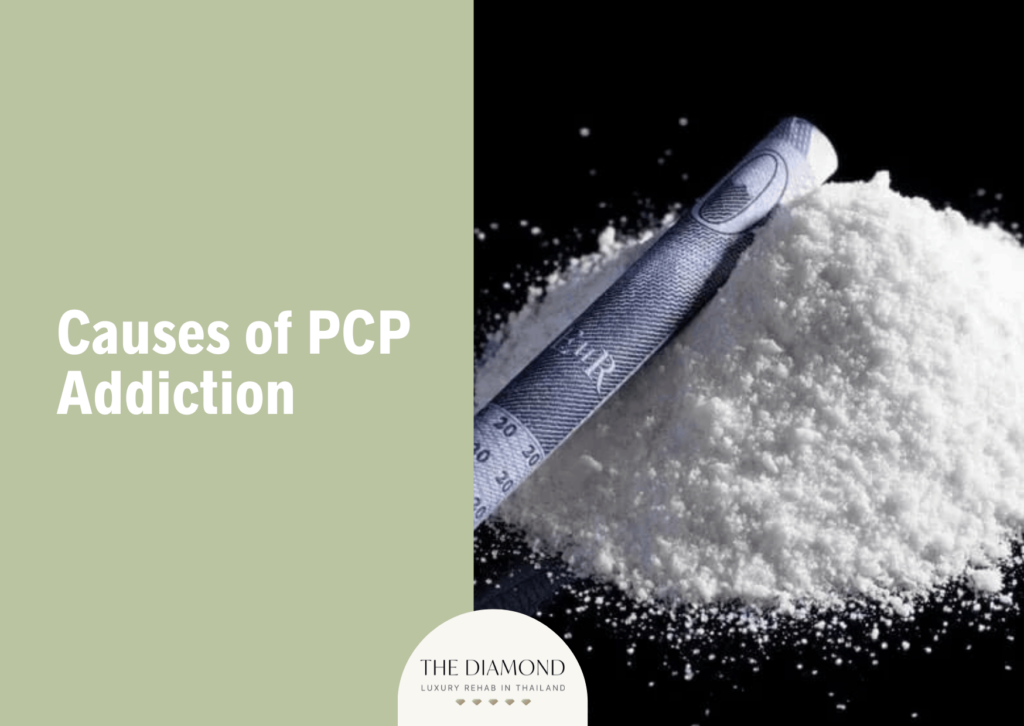
PCP addiction relates to addictive behaviors toward a hallucinogen that’s often called “Angel Dust’ on the street. The drug has a schedule II legal status and is used through snorting, smoking, and swallowing. When PCP causes alterations to dopamine levels in the user’s brain, addiction can follow.
Causes of PCP addiction include genetics, trauma, environmental factors, peer pressure, lack of social support, mental health disorders, poor coping skills, peer pressure, and gateway drugs.
The signs of PCP addiction include memory loss, psychotic behaviors, aggressiveness, and distancing one from things that are usually enjoyable, such as social gatherings with friends.
Side effects of PCP addiction can be short- and long-term. They include increased blood pressure, rapid heartbeat, increased breathing rate and body temperature, aggression, anxiety and depression, lonelines, panic, euphoria, nausea and vomiting, psychosis, memory and reasoning problems, speech difficulties such as stuttering, social withdrawal, suicidal thoughts, building tolerance, overdose and acute kidney failure and seizures.
Risk factors for PCP addiction include childhood events, gender (being male), behavioral traits, personality disorders, heredity, and changes in brain chemistry such as higher dopamine.
Treatments available for PCP addiction include certain medications, along with therapies like cognitive behavioral therapy, that may prove useful. CBT can also be helpful in reducing the risk of relapse in those who are successfully treated.
1. Genetics
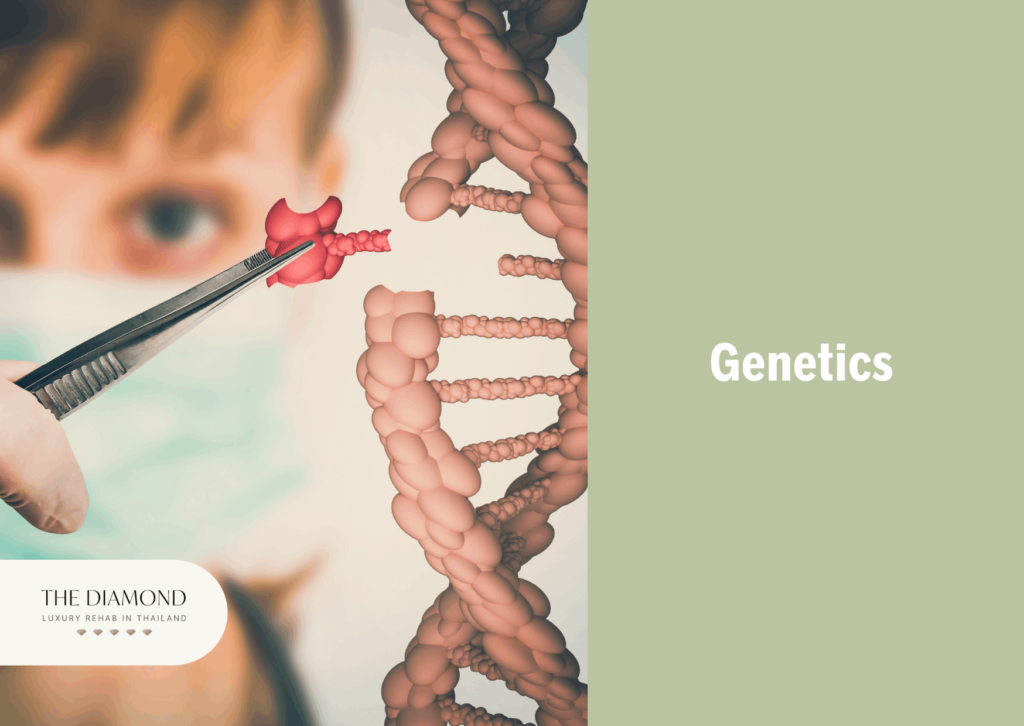
Genes play an important role in humans and carry information that one generation is able to transmit to the next. It’s essentially a DNA molecule segment that contains data related to a single protein. Genes are also involved in heredity, which explains why certain people may naturally be more likely to develop certain illnesses.
The National Institute on Drug Abuse reports that genetics, as well as epigenetics, play a role in the risk of addiction to drugs, including PCP. A research paper published in the Molecular Neurobiology Journal, 1987, authored by P.C. Contreras, et al. explains that PCP has various effects on the human body’s central nervous system. The paper goes on to explain that nicotinic, mu opioid, muscarinic, and sigma receptors are all affected by PCP, or Phencyclidine. Additionally, the drug affects the release of dopamine, as well as norepinephrine and serotonin.
A systematic review by M. A. Patriquin, et al, published in the HHS Public Access Library in October 2015, notes the important role that the dopaminergic system has to play within addiction. Due to the effects that PCP has been shown to have on dopamine levels in the brain, it’s clear that this particular pathway contributes to addiction.
With this in mind, researchers at Radboud University, Netherlands published a paper in the Journal of Studies on Alcohol and Drugs in 2016 explaining that various genetic variations have been found to affect addictive behaviors. While the paper primarily considers addictive patterns toward alcohol and smoking, as well as cannabis use, the findings related to addiction would be present in other drugs and substances that affect dopamine levels too.
2. Trauma

Trauma can occur in different ways and affect the individuals either physically or psychologically. Psychological trauma can have an impact on the person’s emotional state, mood, and overall mental health. Physical trauma can also induce psychological complications. It can result from physical impact that results in a serious physiological disability, or harmful and stressful events that have a mental impact.
When trauma becomes psychological, it could result in depersonalization and numbness, which make people more prone to addictive behaviors.
A paper by S. Simmons, et al. Child and Adolescent Psychiatric Clinics of North America, Volume 25, Issue 4, explains that there is a bi-directional link between addiction and trauma. One can essentially strengthen the other, which creates a vicious cycle. The individual develops trauma, then turns to drugs, such as PCP. The addiction causes a further impact on their psychological well-being and can even result in physiological effects. This bi-directional impact can thus worsen the trauma experienced in the process.
Stress systems in individuals who experienced trauma are often dysregulated. Due to this dysregulation, the dopamine-increasing effects and other “rewarding” feelings that come with the use of PCP and other drugs may be more profound for the individual, increasing the risk of addiction.
3. Environmental factors
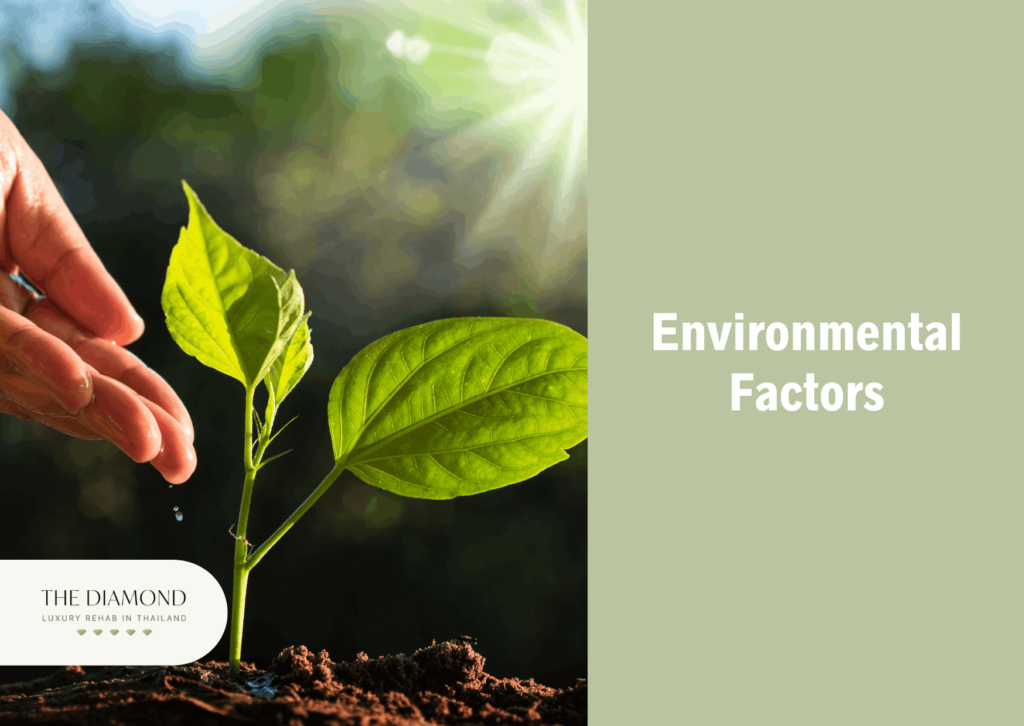
Environmental factors include the individual’s direct family, their household, the community they live in, and what they are exposed to on a daily basis. These environmental factors often start to have an impact during childhood, and the effects can sometimes lead to a higher chance of PCP addiction in teens and adults.
When 559 subjects were assessed in a study that was published in the Military Medicine journal in Aug 2005, researchers found that there are three factors that affect drug abuse risk within a family setting. The effect of the family on the child or teenager, how easy it is to access drugs, and the peers surrounding the individual were the primary factors that contributed.
The researchers also noted that drug users among the subjects were more likely to come from either pathological families or incomplete families. The structure that a family has in terms of authority, along with the atmosphere in the household and the overall happiness shared between family members, were mentioned as primary factors. Additionally, younger individuals exposed to alcoholism within the family were also more likely to become addicts themselves later in life.
4. Peer pressure
Peer pressure is another factor that is included as a cause of PCP addiction. It also falls within the category of environmental factors. Peer pressure is defined as a demand or request from peers, often similar in age as the individual, to do something. In this case, it’s related to drug use, which includes the use of the drug PCP.
In a research published in the journal, Substance Use & Misuse, in 2020, A. Keyzers et al. reported that peer pressure is a common concern in young adulthood, particularly in terms of substance use. Researchers advise that a majority of studies on peer pressure have focused on adolescents in the past. Thus, the study had a focus on young adults aged up to 29 years.
When peers use PCP, the risk of use and the development of addiction, later on, becomes higher in the individual.
5. Lack of social support
Social support from friends and family can play an important role in ensuring a person is able to recover from drug addiction and prevent relapse. Even at the early stages of usage, prior to the development of addiction, social support can assist in reducing the risk of addictive behavior by intervening at the right time.
U. Zaidi, in a paper published in International Journal of Innovation, Creativity and Change journal, 2020, explains that relapse is particularly common in those who do not have social support. They go on to note that different forms of social support play an important role. This includes support from a peer group, which can pose as troubling when the individual is faced with a neighborhood where drug use is common. Apart from these, poor spiritual and emotional support are also listed as factors that contribute to higher incidence rates of addiction and relapse.
6. Mental health disorders
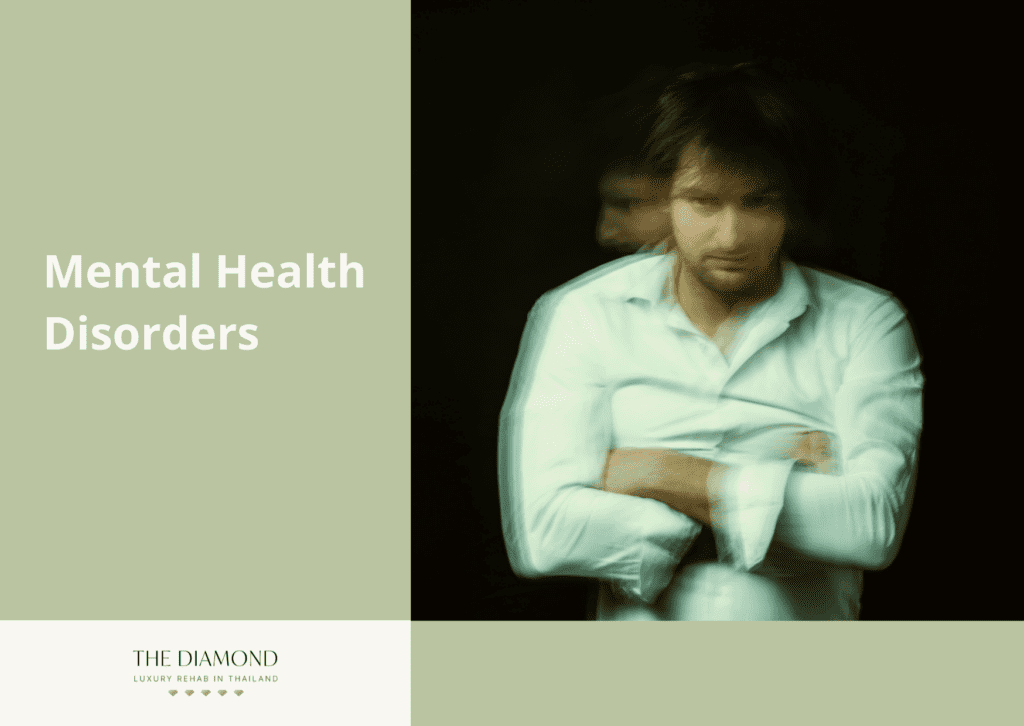
Mental health disorders include depression, generalized anxiety disorder, bipolar disorder, and many others. These conditions affect mood, how one thinks, and can even result in behavioral changes. Johns Hopkins Medicine estimates that about 26% of people in the United States (adults) have one or more mental disorders. They also explain that it’s not unusual to see more than one of these disorders affect a person.
A strong link seems to exist between mental health disorders and the risk of PCP addiction, as well as addictive behaviors toward other drugs. The National Institute of Mental Health explains that individuals with a mental health disorder (or disorders) may turn to these substances to “self-medicate”. The drugs may cause temporary improvements in how the individual feels, but in the long term, can be disruptive to their mental health. Due to the changes in neurotransmitters among those who have a mental disorder, the fact that PCP causes a release of dopamine and other chemical messengers could also make the individual more susceptible to addiction. The individual ends up craving more of the effects that they experienced while using the drug.
7. Poor coping skills
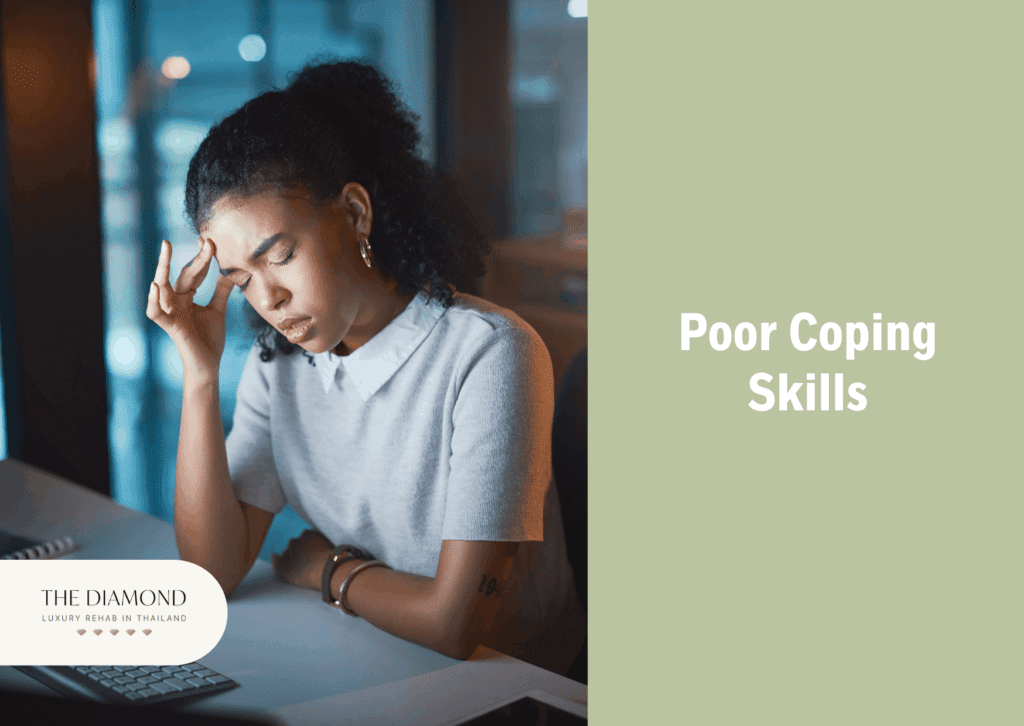
Coping skills refers to the ability to handle stressful situations. From grief to financial loss, there are many types of situations that require good coping skills. Certain people have poor coping skills, which could cause them to turn to impulsive behaviors as a way of “coping”. These impulsive behaviors can at times include the use of drugs. It’s often thought of as self-medication as it temporarily gives the individual the ability to “forget” about what is causing them stress.
S. Heshmat, Ph.D, explains in a Psychology Today entry, that people have different ways to respond to stressful situations, especially in cases where coping skills are not adequate. This may include starting to smoke or eating more than usual, for example. Alcohol is also something that people tend to turn to in these situations, as well as drugs.
A Frontiers in Psychology study, published in 2021, explains that grief is a good example of where poor coping skills and substance use disorder link together. Those who already use illicit drugs tend to have more complications in terms of coping with the grieving process. Thus, there is an urge to assist these individuals with strategies to adopt coping mechanisms, as this could prevent aggravated drug usage.
8. Peer group
Similar to peer pressure, groups that a person is a part of may also be a potential cause behind PCP addiction. It should be noted that the term “group” is broad and can be associated with factors from a neighborhood to a “gang” that the individual decided to join.
When other individuals who are part of the “peer group” use PCP, the individual may find themselves feeling pressured into doing the same. This is often a call to “fit in” with the group.
Research findings published by J.C. Strickland and M.A. Smith, published in the HHS Public Access library, 2014, investigated the impact of social environments on the risk of drug abuse. Social environments often define the peer groups that the individual is exposed to. The research also suggests that particular social factors that are present within the time when the individual is exposed to illicit drugs also have an impact.
9. Gateway drug
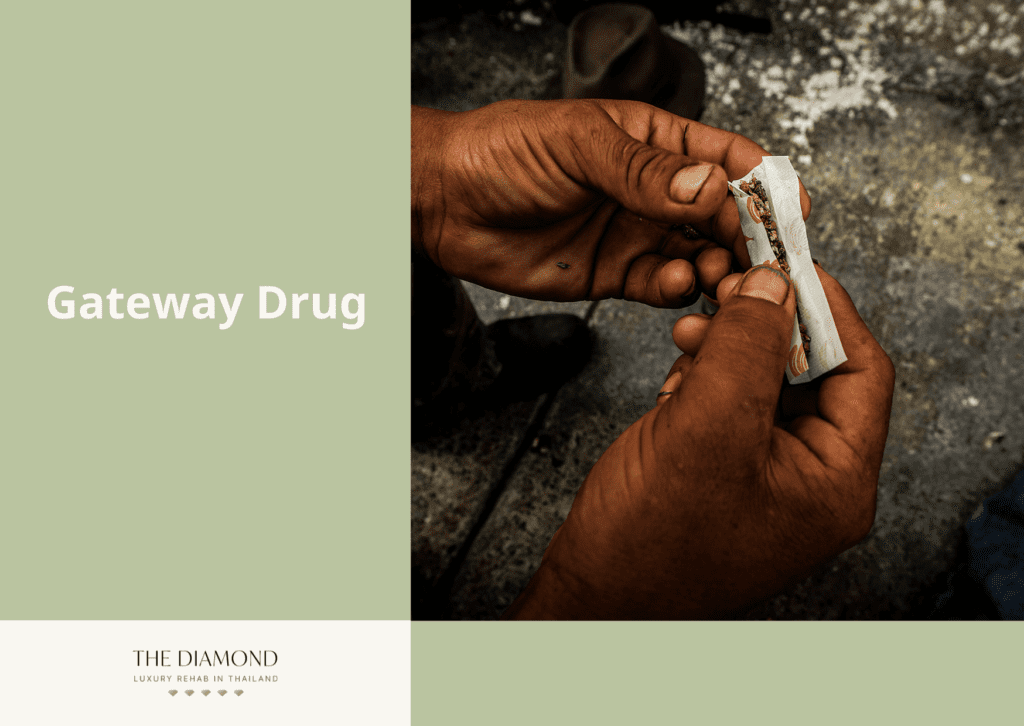
The term gateway drug refers to milder, often socially acceptable, drugs that pave the way to the use of harsher and more dangerous substances. These may include alcohol, smoking, and even marijuana.
There is debate about whether or not marijuana is considered a gateway drug. R. S. Villa, et al. explain in a national study published in The International Journal on Drug Policy, 2015, that marijuana may be an indicator or a predictor of future drug use. The research found that 44.7% of the subjects considered during the study moved from marijuana to other illicit drugs at some point.
There is debate about whether or not marijuana is considered a gateway drug. R. S. Villa, et al. explain in a national study published in The International Journal on Drug Policy, 2015, that marijuana may be an indicator or a predictor of future drug use. The research found that 44.7% of the subjects considered during the study moved from marijuana to other illicit drugs at some point.
When anybody decides to use marijuana, he may feel more inclined to use other drugs, such as PCP, in the future. With this said, the information provided by the National Institute on Drug Abuse states that other potential explanations should also be considered. For example, the article describes the possibility that those who are more likely to experience substance use disorder may be more drawn to marijuana as the “first choice.”
The point here is that the use of one drug could potentially lead to the use of another. In this particular instance, the use of tobacco, alcohol, or marijuana could potentially increase the risk of turning to PCP.
What is PCP addiction?
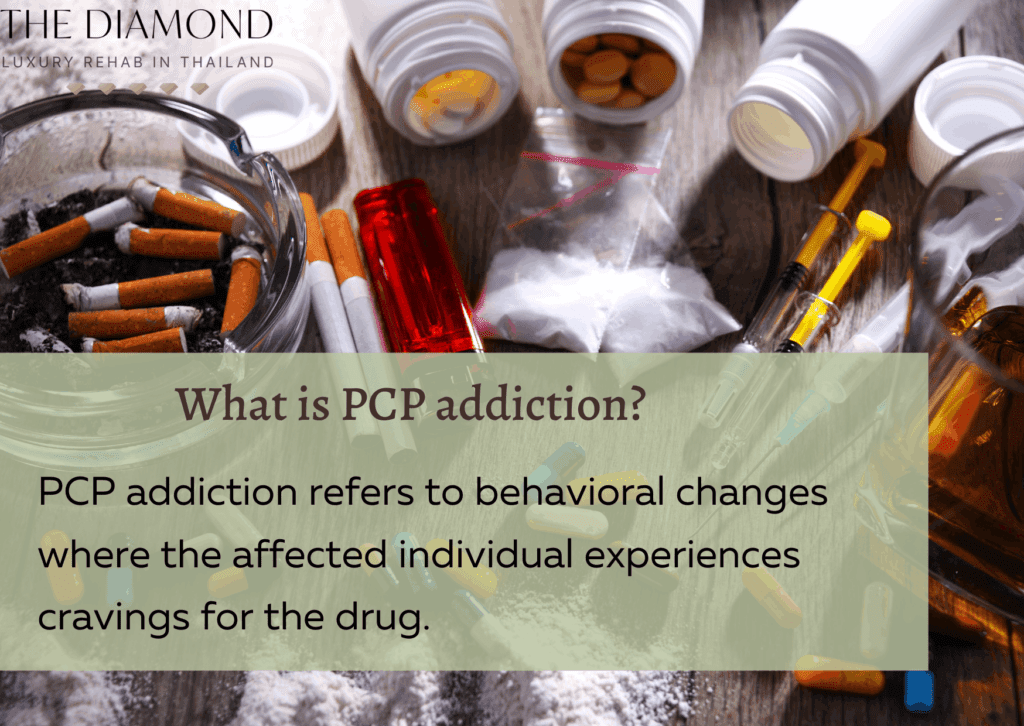
PCP addiction refers to behavioral changes where the affected individual experiences cravings for the drug. When the person is unable to gain access to PCP, or Phencyclidine, they start to experience withdrawal symptoms. These withdrawal symptoms can range from mild to severe, as it largely depends on how long the individual has used PCP and how much of the drug they use at a time.
The National Drug Intelligence Center reports that the drug was initially utilized as an anesthetic. Due to the side-effects it harbored, it was discontinued for use on humans. The use of PCP in humans today is linked to substance abuse. They also report that PCP comes in various forms, including tablets, capsules, and powder. It is a highly dissolving powder that can be mixed with liquids. Sometimes, it is also applied to herbs and marijuana prior to smoking it.
Current statistics, provided by the National Drug Intelligence Center, estimate that about six million individuals in the United States have used PCP one time or more throughout their lifespan. Statistics also show that about 225,000 young adolescents, between 12 and 17 years of age, have used PCP before. The statistics for young adults between 18 and 25 show that 777,000 have used the drug.
Further data have revealed that about 1% of high school senior students may utilize PCP at least once annually. Data provided by the Substance Abuse and Mental Health Services Administration (US) also reports that within the United States, an estimated 120,000 individuals (12 years and older) use PCP once or more each year. Furthermore, the data also suggests that the average age of first use is around 15 years.
What to know more about PCP addiction?
Data published in The CBHSQ Report explains that between 2005 and 2011, there was a significant rise in the use of PCP among young adults. Visits related to the use of Phencyclidine to the Emergency Department had increased by over 400% within this particular period. In 2005, 14,825 visits were recorded among the areas considered in the study. By 2011, this figure had risen to 75,538 incidents in a one-year period. An especially significant increase was seen between 2009 and 2011, when the number of incidents per annum doubled. Furthermore, a 500% increase in Emergency Department visits related to PCP usage was seen within this period among those individuals who are between 25 and 34 years.
In the modern day, the use of PCP continues to rise. Even in street samples of marijuana, traces of PCP are starting to show up. American Addiction Centers report that in one survey, the presence of PCP was identified in 24% of such samples.
Understanding the risk factors, side-effects, and symptoms is important. Loved ones can often use this data to identify PCP usage in an individual, which can lead to intervention.
What are the risk factors for PCP addiction?
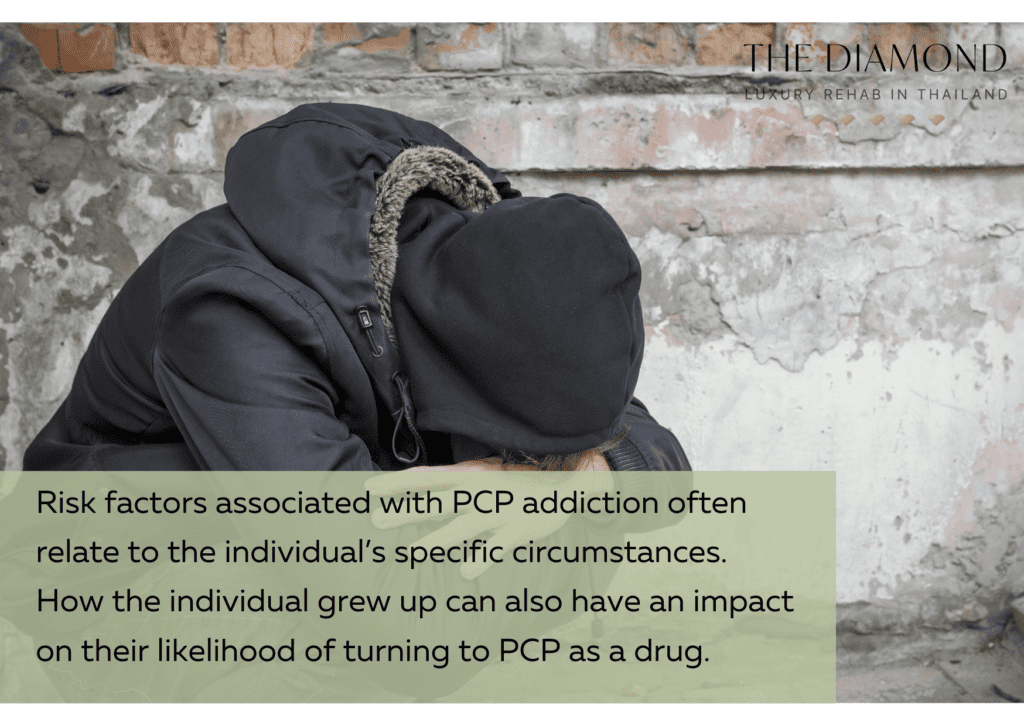
Risk factors associated with PCP addiction often relate to the individual’s specific circumstances. How the individual grew up can also have an impact on their likelihood of turning to PCP as a drug.
Certain behavioral traits have been associated with a higher risk of addiction to substances, which can include PCP, states a paper published in the April 2016 issue of CNS Spectrums journal by D. Munno et al. The researchers also reported that addictive behaviors toward substances were identified more frequently in males compared to females. Adolescents were the main focal point of the study. Researchers also note that other determinants related to personality and behavior could also be observed.
Some controversy exists, however. Data published in the January-February 2000 issue of L’Encephale journal by P. Franques et al. explains that research has already found that a specific “addictive personality” does not seem to exist. Instead, there are more factors that need to be taken into consideration. In particular, personality disorders do seem to play a role in determining the risk factors for PCP addiction.
Borderline personality disorder was noted as one of the most profound personality conditions linked to the use of addictive behaviors in the assessment. Furthermore, when treatment for substance abuse is initiated, those with personality disorders have a harder time with the recovery process.
Brain chemistry also plays a role in the risk of PCP addiction. This is where neurobiology comes in. Depression affects the brain’s chemistry, leading to an imbalance in neurotransmitters. An article by Mayo Clinic suggests that problems with how neurotransmitters interact with each other in the brain hold relation to a condition like depression. In depression, there is often a reduction in certain neurotransmitters. This imbalance in neurotransmitters may contribute to the increased cravings experienced following the first few uses of PCP. The use of PCP causes dopamine levels to increase and also affects other neurotransmitters, as with other illicit substances. Research published in Adicciones, 2018, by J.T. Munoz, et al. explains that depression and substance use disorders are some of the most commonly found dual diagnoses.
The individual’s environment also plays a role in the risk factors. This includes the environment the individual grows up in, as well as the current neighborhood elements. The research by M. Fouyssac et al. in the March 2021 issue of European Journal of Neuroscience notes that the environment has a significant impact on the vulnerability to addiction of the individual. Those who are present in an environment where drug use is common tend to be more likely to use illicit substances themselves.
A paper published in the September 2016 issue of the Journal of Studies on Alcohol and Drugs by Jacqueline M. Vink from the Radboud University in the Netherlands, also states that future research should focus on the link between genetics and environmental interactions, and how these factors contribute to the development of addiction in the individual. The researchers note that there seems to be a significant link between heritability and addiction, rating this connection as “moderate to high.”
What are the side effects of PCP addiction?
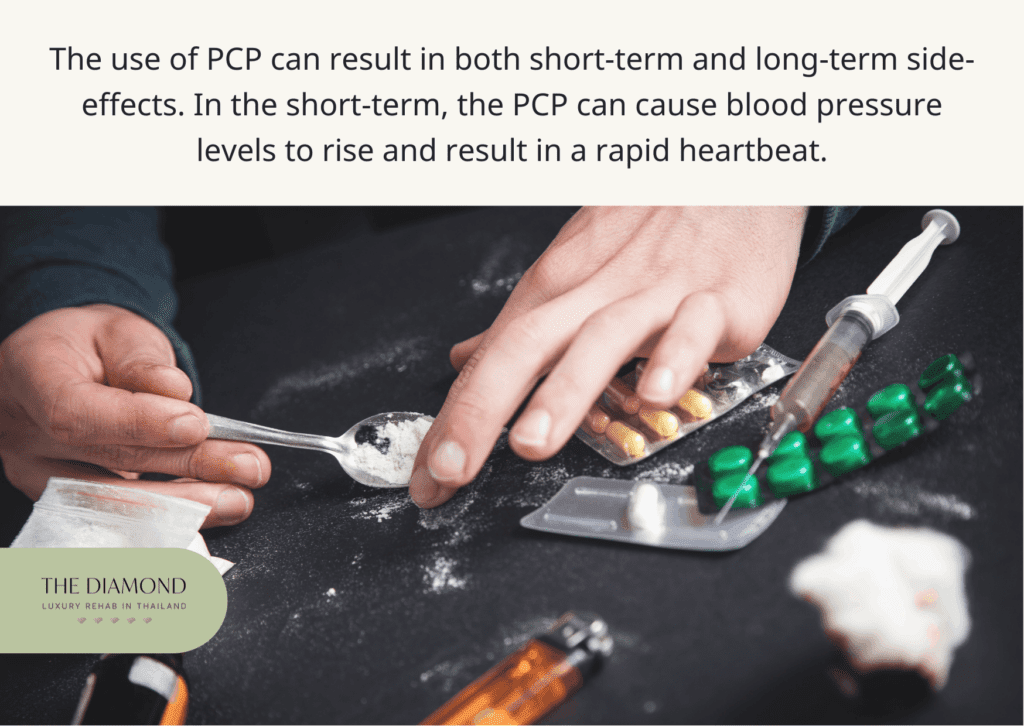
The use of PCP can result in both short-term and long-term side-effects. In the short-term, the PCP can cause blood pressure levels to rise and result in a rapid heartbeat. Breathing rate may increase, and the individual may experience alterations in their mental state. This may include aggression. Certain individuals experience heightened feelings of anxiety when they use PCP. Loneliness is another side-effect that has been associated with PCP use.
When individuals use PCP, they generally experience a sense of euphoria. There are often also distortions that occur within how the individual perceives sound and vision. Furthermore, a feeling of being detached from their own body is also commonly reported when individuals use this substance. These effects are primarily due to the fact that PCP is known to be a hallucinogen.
Advanced Recovery Systems reports that short-term effects of PCP can also result in panic among the individual who uses the substance. Some individuals may experience an increase in their body temperature. Nausea and vomiting are also acute side-effects that can be noted.
Research published by StatPearls Publishing, 2023, also notes that phencyclidine toxicity is something of concern. This results in the misuse and abuse of the drug. In addition to depressive symptoms and anxiety, the research also notes that individuals may experience psychosis as a result of the drug’s effect on the central nervous system. The drug induces both depressive and stimulative effects on the central nervous system and affects the NMDA receptors in the human body.
According to Healthline, psychosis can result in numerous symptoms. This may include problems with concentration and the inability to think normally. Paranoia and sudden withdrawal from loved ones, and having no feelings are also common symptoms that can be present in psychosis. Individuals who experience psychosis as a side-effect of PCP usage may also result in problems understanding the difference between reality and things that are not real. Communication problems are also commonly seen in individuals who experience psychosis. An episode of this particular side-effect can also result in strange behaviors, catatonia, delusions, and hallucinations. Due to the hallucinogenic effects of PCP, the hallucinations experienced in psychosis as a side-effect may be more severe.
It is important to understand that PCP usage can produce long-term effects too, which is commonly seen in individuals who have an addictive behavior toward the substance. Long-term use of PCP can cause issues with memory, and the individual’s reasoning abilities may also be adversely affected. Individuals can also experience difficulties with their speech and may start to stutter. It is also common for individuals to withdraw themselves from social settings, preferring to be isolated from other people.
Data published by Narconon also states that long-term use of PCP can result in depression and other mental health disorders, such as anxiety. The individual may experience frequent episodes of anxiety, which may be more severe in times when they have not used the substance for a period of time.
Apart from these side-effects, another important negative factor associated with long-term use of PCP is suicidal thoughts. Individuals who have used the substance for some time may have thoughts about harming themselves or committing suicide. In some situations, these thoughts may lead to suicidal attempts.
Another important long-term side-effect is the tolerance that an individual can build up to PCP. As the individual continues to use PCP on a regular basis, their body develops tolerance toward the substance. This generally causes the individual to frequently increase the “dose” of PCP they use. When the dose continuously increases, it raises concerns about a PCP overdose.
Advanced Recovery Systems report that there are various symptoms that can occur in case of a PCP overdose. The individual may experience an irregular heartbeat and muscle stiffness when they overdose on this substance. Shivering is also a common overdose system, along with vision-related difficulties and delusions. Paranoia can also occur following an overdose of PCP.
Due to the fact that the kidneys need to filter the PCP, an overdose can sometimes also result in acute kidney failure. Severe overdoses can cause the individual to experience seizures. There are also some situations where the individual falls into a coma when they overdose on this substance. It is also important to understand the fact that a PCP overdose can result in life-threatening effects and requires emergency medical treatment.
What are the symptoms of PCP addiction?
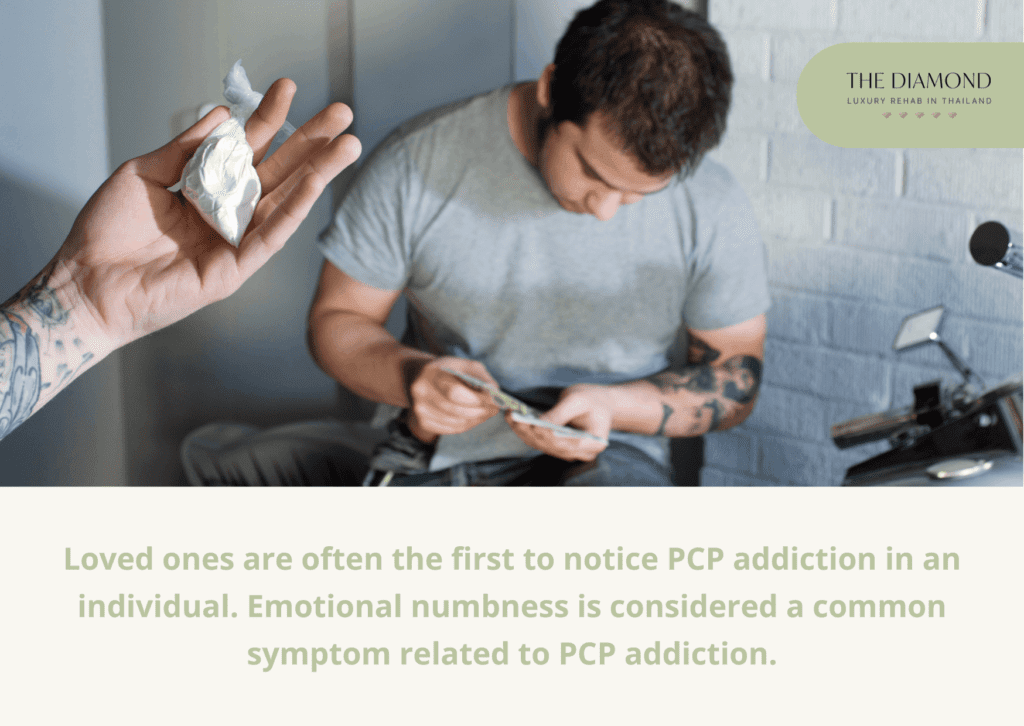
Loved ones are often the first to notice PCP addiction in an individual. Emotional numbness is considered a common symptom related to PCP addiction. The individual may seem like they do not have emotions. Many individuals who are addicted to PCP also experience slurred speech. They have difficulty communicating with others. Narconon also reports that the person may seem like they have a blank stare, and their eye movements seem rapid and involuntary.
Dr. Michael E. Wolf explains in his January 2022 post on Addictions.com that amnesia is also common in PCP addiction. Loved ones may notice that the affected individual has a difficult time recalling names, numbers, and even past events. The individual may experience frequent mood swings.
Loved ones may also find that the individual affected by PCP addiction seems stiff – almost like they have robotic movements. They may experience nausea regularly and vomit as well. Signs of vision troubles may also occur in the affected individual, and reasoning with them may seem impossible. The person may also be delusional.
When the individual is confronted about their PCP usage, they will continue to use the substance even though concerns have been raised by their loved ones. Even when the individual knows the PCP is causing themselves harm both physiologically and psychologically, the use of the substance remains persistent.
A review paper published in The International Journal of the Addictions, authored by B.L. Davis, explains that violent behavior is also a common consequence of PCP abuse. The individual affected by the addiction may become more violent than usual, potentially putting the lives of themselves or others in the surrounding area in danger.
A loved one may also notice that the individual experiencing the PCP addiction withdraws from things they usually enjoy doing.
When the individual tries to stop using PCP, they may fail consistently. The individual may have short-term success but experience a relapse where the use of PCP is continued once again. PCP addiction can also be recognized when the individual relapses following admission to a rehabilitation center.
How is PCP addiction diagnosed?
There are more than 10 signs of addiction that medical professionals consider when making a diagnosis of PCP addiction. The diagnosis is made when the individual experiences two or more of these signs within a one-year period, as explained by Dr. Michael E. World at Addictions.com.
The specific signs that medical professionals will consider include:
- The use of PCP even when intervention has been conducted by loved ones.
- The use of PCP in cases where the individual understands the substance may endanger their own life or the lives of others in the surrounding environment.
- The use of more PCP than the individual initially intended.
- Failing to reduce the frequency and dose of PCP in an attempt to stop the use of the substance.
- Reduced interest in activities the individual used to enjoy and prioritizing PCP usage over socializing and work or school.
- Gradual increase in the dose and frequency of PCP use due to the development of a tolerance toward the substance.
- Developing signs of dependence and experiencing withdrawal symptoms in the absence of PCP usage.
- The continued use of PCP when the individual realizes the impact drug abuse has on their relationships and life.
- A consistent craving to take PCP, which often leads to increased doses.
- Time-consuming efforts in obtaining PCP and going extra lengths when the individual is unable to obtain the substance using their usual methods.
When the individual meets two or more of the mentioned criteria, they require treatment in order to halt the addictive behavior that has developed toward the PCP substance.
What are the treatments for PCP addiction?
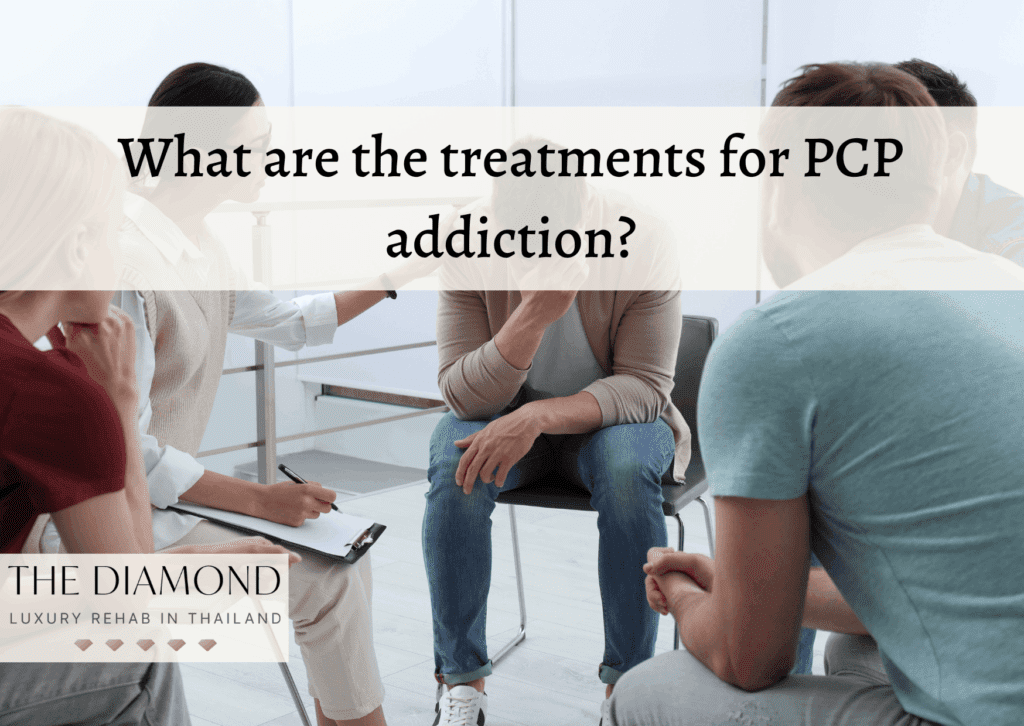
There is no specific treatment for PCP addiction, and the strategies used differ from one person to another. A combination of therapies to detox the body and address the underlying factors resulting in PCP addiction is considered the most effective treatment strategy.
In cases of severe PCP addiction, an inpatient treatment program is advised. This program helps to ensure the individual does not have access to PCP or other substances throughout the treatment period. It also provides professional medical supervision during the treatment, ensuring appropriate actions are taken upon the development of withdrawal symptoms.
The individual may experience a number of symptoms during the withdrawal phase. This includes an increase in cravings for PCP, as well as headaches and depression symptoms. An increase in perspiration and feeling sleepy for prolonged periods of time, even with sufficient sleep, are also relatively common in PCP withdrawal.
Psychiatric treatment is often required to address the mental health concerns that result from PCP addiction. Medical News Today explains that a psychiatric evaluation is required to determine the mental complications caused by addiction. The severity of these complications depends on how long the individual has used PCP and the doses they took.
When it comes to PCP addiction symptoms and treatment, both therapy and medication may be used in order to treat mental health complications, as well as to assist in reducing the cravings the individual experiences during the detox period.
Can medicines be used to treat PCP addiction?
No, there are no FDA-approved medications for the treatment of PCP addiction. However, there are certain cases where medication may be used in patients who present signs of PCP addiction or withdrawal symptoms.
Researchers from the University of Central Florida, J.D. Journey, and T.P. Bentley, explain that sedation may be utilized in cases where the patient experiences acute effects of PCP toxicity. This is the case when an overdose of PCP is noted. Severe PCP addiction may also result in more serious withdrawal symptoms, in which case the use of sedative medicine could be useful. In the data presented by J.D. Journey and T.P. Bentley, it is suggested to use benzodiazepines as the solution for chemical sedation. Diazepam and lorazepam are both considered efficient in reducing symptoms like agitation, psychosis, and violence among individuals.
A study published by L.A. Ray et al. in the June 2020 issue of the JAMA Network Open journal reports that various pharmaceutical interventions may be used in the treatment of substance use disorder. The use of certain pharmaceuticals may relieve some withdrawal symptoms and help to ease the recovery process. Specific pharmaceuticals the study found to be effective included naltrexone, disulfiram, acamprosate calcium, and methadone hydrochloride.
Is detoxification recommended for PCP addiction treatment?
Yes, PCP addiction treatment often includes detoxification due to the effects that the addictive behaviors toward PCP have on the individual. During professional detoxification, the individual may be admitted to an inpatient program if they have severe PCP addiction. An outpatient program is used in mild to moderate cases of addiction.
A paper published by A.M. Diaper et al. in the February 2014 issue of British Journal of Clinical Pharmacology suggests that detoxification with medications works, but it needs to be accompanied by psychosocial treatment. These findings indicate medications should be combined with therapy such as CBT. Cognitive behavioral therapy assists patients in adopting strategies that limit or eliminate thought processes that lead to addiction and relapse. Pharmacotherapy during detoxification primarily focuses on reducing the severity of withdrawal symptoms.
Can nutritional therapy be used to treat PCP addiction?
Yes, nutritional therapy is used in cases where an individual is treated for PCP addiction, due to the nutritional deficiencies often noted in substance use disorder. Proper nutrition plays an important role in the healing process following addiction, explains A. Salz, in an article published on Today’sDietitian. Deficiencies in micro and macronutrients can increase feelings of anxiety and depression, and lead to poor energy levels.
It should be noted, however, that nutritional therapies are not a replacement for pharmaceuticals and cognitive behavior therapy used during the detox period. The individual may experience weight loss due to PCP addiction long after recovery, which is another area where nutritional therapy plays an important role. Research by Kendall D. Jeynes and E. Leigh Gibson from the University of Roehampton in London, UK and published in the October 2017 issue of Drugs and Alcohol Dependence journal also confirms the fact that nutritional deficiencies are especially common in those who experience substance use disorder.
Researchers considered numerous studies that have been previously published to determine the impact of nutrition on drug abuse and recovery. It was also found that nutritional deficiencies might impact the addict’s ability to recover and could potentially reduce the individual’s ability to resist the use of addictive substances. Individualized nutritional therapies are required for PCP addiction and recovery. The research further explains that alterations to body composition is often observed in substance use disorder, along with changes to hormones involved in the regulation of the metabolic processes.

